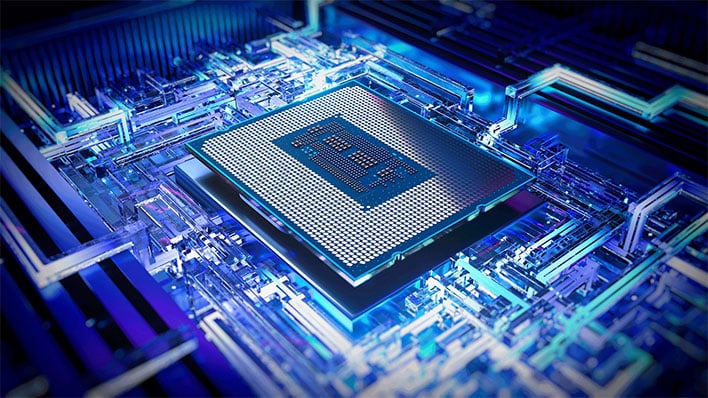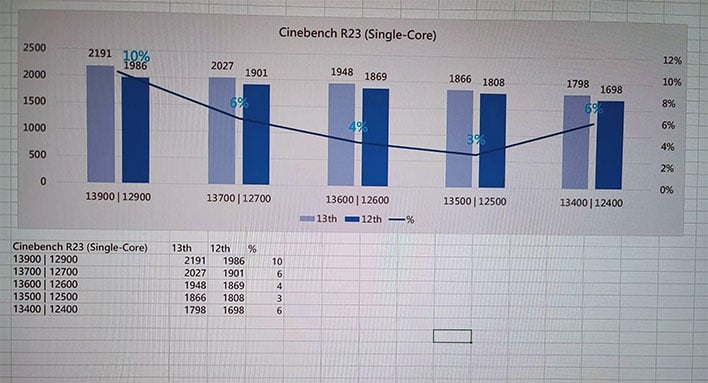Intel's 13th Gen Non-K Raptor Lake CPUs Pummel Alder Lake By Up To 64% In Benchmark Leak

It's only a matter of time before Intel fleshes out is lineup of 13th Gen Core processors based on Raptor Lake. There's a still a mobile onslaught coming, and on the desktop it's expected Intel will soon unveil its first non-K CPUs within the Raptor Lake range. As we wait, some impressive benchmark results of those upcoming non-K chips have leaked, potentially giving us an early look at what's to come.
We say "potentially" because there are a lot of variables that come with leaks—platform, system settings, cooling, and other testing conditions, along with there being the possibility that the results are doctored. As always, the usual 'take with a grain of salt' advice applies.
Disclaimer out of the way, the benchmark results come by way of chi11eddog (@g01d3nm4ng0), a hardware leaker on Twitter. They posted a couple of spreadsheets comparing Cinebench R23 single-core and multi-core benchmark results between the upcoming non-K Raptor Lake CPUs and the Alder Lake parts they supplant. In response to a question asking if the charts are from Intel or a board partner, chi11eddog responded, "It's from board partner for analysis."
We've cleaned up the images a bit just to make them brighter and easier to read. Let's start with the single-core spreadsheet...
Source: chi11eddog (via Twitter)
The spreadsheet outlines benchmark scores for Intel's upcoming 13th Gen Core i9-13900, Core i7-13700, Core i5-13600, Core i5-13500, and Core i5-13400 Raptor Lake processors, with comparisons to each one's 12th Gen Alder Lake counterpart.
What we see are mostly minor bumps in single-threaded performance, though the Core i9-13900 does manage to outpace the Core i9-12900 by 10 percent in this roundup. If taking the average of all five comparisons, however, the performance uplift is 5.8 percent. That's fairly tame, though Raptor Lake is not as big of an architectural jump over Alder Lake as Alder Lake was over Rocket Lake.
The multi-core results are much more intriguing. Have a look...
Here the leaked benchmarks show a substantially bigger performance disparity between Raptor Lake and Alder Lake. The Core i9-13900 that performed 10 percent better in the single-threaded test was able to trounce its Alder Lake counterpart by 53 percent in the multi-threaded test. And while the Core i5-13500 showed the smallest single-threaded performance uplift against the Core i5-12500 at just 3 percent, it boasted the biggest jump in multi-threaded performance at 64 percent.
If we average out the results, the multi-threaded performance gain from the benchmark figures in this spreadsheet comes in at 47.6 percent. That's an impressive leap, though not necessarily unexpected. It has to be noted that while Raptor Lake keeps the number for Performance cores (P-cores) the same as Alder Lake, it doubles the number of Efficiency cores (E-cores), depending on the model, which also adds more threads to the mix.
For example, the Core i9-13900K is a 24-core/32-thread chip configured with 8 P-cores and 16 E-cores, while the Core i9-12900K is a 16-core/24-thread CPU, also with 8 P-cores but just 8 E-cores. The Core i9-13900K also boasts a significantly faster max turbo frequency at 5.8GHz, versus 5.2GHz for the Core i9-12900K, and more L3 cache (36MB versus 30MB).
As such, these results don't solely come down to the architectural change, they also represent upgraded specs. That said, it's ultimately the bang-for-buck proposition that really matters. If pricing on the non-K Raptor Lake CPUs launch at or near the same place as their non-K Alder Lake counterparts did, then these multi-core performance uplifts become all the more meaningful, no matter what core and clock advantages they bring with them.
We should know soon enough—it's expected Intel will launch more Raptor Lake CPUs (including non-K parts) at the Consumer Electronics Show (CES) next month.



